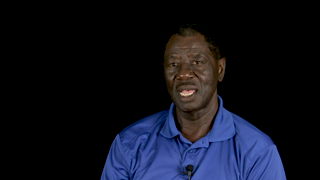3:53 | It was flat in the delta. You could see for miles and that made for good flying, says helicopter pilot Omer McCants. It was wet, a lot of rain. Back at the base, they hung out in the officers club, where he spent a lot of time reading and writing letters home. He was aware of the anti-war movement, but it made no difference to him.
Keywords : rice paddies rain monsoon officers club letter anti-war food C-ration civilian mama-san

Omer McCants was born in a little Alabama town where everyone worked in the textile mills. He decided that was not for him, worked hard, and was the first in his family to graduate high school and go on to college. ROTC attracted him and he began to think like a military man.
It was an easy commitment to make. Omer McCants stayed in the ROTC program so he would enter the Army as an officer, not a private. Not only that, but he was going to flight school. He had an advantage there because at Tuskegee he received flying lessons from the legendary Chief Anderson.
His home town in Alabama was completely segregated. To Omer McCants, it wasn't good but it was "even." In the Army, there was no outward expression of hostility, but he knew he was excluded. He came in knowing he had to work twice as hard and that worked out for him.
Most of the helicopter pilots were Warrant Officers, but Omer McCants was an RLO, a real live officer. He saw a lot of action on his first flight and was a bit flustered, but the aircraft commander said something that settled him down for the rest of his part in the war. He was down in the Mekong Delta, hauling Vietnamese troops on combat assaults.
Helicopter pilot Omer McCants relates a few tales of missions that got a little intense. He narrowly missed setting down in a Viet Cong base and on another mission, he struggled to take off while heavily overloaded. Then there was acting as a bait ship to draw fire on a type of mission they called "Firefly."
He had three close friends in Vietnam, but he struggles to remember any other names. The other relationships were professional, but not close. He actually outranked the man he thought was the best leader he encountered, a Warrant Officer who was talented and knowledgable.
It was like heaven when he saw the Golden Gate bridge. He had made it through his Vietnam tour. Omer McCants went home to Alabama, reunited with his wife, and reported to Fort Rucker for his next assignment. When he eventually prepared to leave the military, a corporal processing his paperwork asked him a fateful question.
He went because his country said go, not because he wanted to kill innocent people. Omer McCants still doesn't understand why his own countrymen treated returning Vietnam veterans so badly.